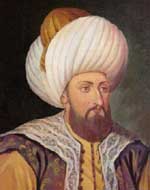John Anagnostes on:
[Wikipedia]
[Google]
[Amazon]
John, called Anagnostes (i.e. ''lector'', ''reader;'' el, Ἰωάννης Ἀναγνώστης), was a
 Beginning on March 29, 1430, the Ottoman sultan
Beginning on March 29, 1430, the Ottoman sultan
View online.
English ed. in Melville-Jones, John R. ''Venice and Thessalonica 1423-1430: The Greek Accounts''. Archivio del Litorale Adriatico, 8. Padova: Unipress, 2006. . Eugenia Russell, ''St Demetrius of Thessalonica; Cult and Devotion in the Middle Ages'', Peter Lang, Oxford, 2010, pp. 133–45. 15th-century Byzantine historians Byzantine Thessalonian writers Ottoman Thessalonica {{Byzantine-bio-stub
Greek
Greek may refer to:
Greece
Anything of, from, or related to Greece, a country in Southern Europe:
*Greeks, an ethnic group.
*Greek language, a branch of the Indo-European language family.
**Proto-Greek language, the assumed last common ancestor ...
historian of the fifteenth century. He was an eyewitness to the Ottoman sack of Thessalonica
Thessaloniki (; el, Θεσσαλονίκη, , also known as Thessalonica (), Saloniki, or Salonica (), is the second-largest city in Greece, with over one million inhabitants in its metropolitan area, and the capital of the geographic region of ...
on March 29, 1430; an event he described in detail in his ''Account of the Last Capture of Thessalonica'' (), which he wrote with an accompanying monody
In music, monody refers to a solo vocal style distinguished by having a single melodic line and instrumental accompaniment. Although such music is found in various cultures throughout history, the term is specifically applied to Italian song of ...
lamenting the city's fall.
Background
Thessalonica had been captured by the Ottomans in 1387; though they were unable to hold the city in the wake of theBattle of Ankara
The Battle of Ankara or Angora was fought on 20 July 1402 at the Çubuk plain near Ankara, between the forces of the Ottoman Sultan Bayezid I and the Emir of the Timurid Empire, Timur. The battle was a major victory for Timur, and it led to the ...
in 1402 when it reverted to the Byzantine Empire
The Byzantine Empire, also referred to as the Eastern Roman Empire or Byzantium, was the continuation of the Roman Empire primarily in its eastern provinces during Late Antiquity and the Middle Ages, when its capital city was Constantinopl ...
. The Byzantines, when they were unable to hold the city, sold it to the Republic of Venice
The Republic of Venice ( vec, Repùblega de Venèsia) or Venetian Republic ( vec, Repùblega Vèneta, links=no), traditionally known as La Serenissima ( en, Most Serene Republic of Venice, italics=yes; vec, Serenìsima Repùblega de Venèsia, ...
in 1423; though not in time to mount a defense against another Ottoman siege that year. The Ottomans were again unable to hold the city permanently, and the Venetians and Ottomans were soon in a full state of war.
Siege of Thessalonica
 Beginning on March 29, 1430, the Ottoman sultan
Beginning on March 29, 1430, the Ottoman sultan Murad II
Murad II ( ota, مراد ثانى, Murād-ı sānī, tr, II. Murad, 16 June 1404 – 3 February 1451) was the sultan of the Ottoman Empire from 1421 to 1444 and again from 1446 to 1451.
Murad II's reign was a period of important economic deve ...
began a three-day siege of Thessalonica, resulting in the conquest of the city by the Ottoman army, and the taking of 7,000 inhabitants as slaves. The Venetians agreed to a peace treaty and withdrew from the region in 1432, leaving the Ottomans with permanent dominion over the region.
References
Greek ed., with Latin translation by L. Allatius, published with Sphrantzes in ''Corpus Scriptorum Historiae Byzantinae
The ''Corpus Scriptorum Historiae Byzantinae'' (CSHB; en, Corpus of Byzantine history writers, italic=yes), also referred to as the Bonn Corpus, is a monumental fifty-volume series of primary sources for the study of Byzantine history (–1453 ...
'', 1838, p. 483-534. (Immanuel Bekker
August Immanuel Bekker (21 May 17857 June 1871) was a German philologist and critic.
Biography
Born in Berlin, Bekker completed his classical education at the University of Halle under Friedrich August Wolf, who considered him as his most promis ...
, ed.View online.
English ed. in Melville-Jones, John R. ''Venice and Thessalonica 1423-1430: The Greek Accounts''. Archivio del Litorale Adriatico, 8. Padova: Unipress, 2006. . Eugenia Russell, ''St Demetrius of Thessalonica; Cult and Devotion in the Middle Ages'', Peter Lang, Oxford, 2010, pp. 133–45. 15th-century Byzantine historians Byzantine Thessalonian writers Ottoman Thessalonica {{Byzantine-bio-stub